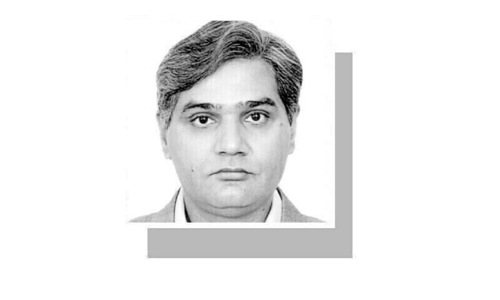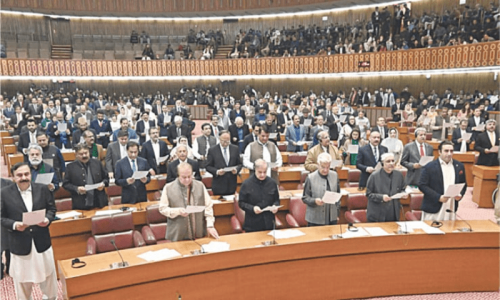The Supreme Court adjourned on Monday its hearing on the legality of the current situation in the country following the dismissal of a no-confidence motion against Prime Minister Imran Khan by National Assembly (NA) Deputy Speaker Qasim Suri and the subsequent dissolution of the NA by President Arif Alvi on the prime minister's advice till 12pm on Tuesday (tomorrow).
Chief Justice of Pakistan (CJP) Umar Ata Bandial had earlier in the day said the court would issue a "reasonable order" on the issue today.
His remarks had come as a larger bench of the Supreme Court – comprising the CJP, Justice Ijazul Ahsan, Justice Mazhar Alam Khan Miankhel, Justice Munib Akhtar and Justice Jamal Khan Mandokhail — took up the matter.
During the proceedings, Justice Ahsan noted that there were violations in the proceedings of the no-trust resolution.
Justice Bandial observed that a debate before voting on the no-confidence motion had been clearly mentioned in the law but didn't take place.
Meanwhile, Justice Akhtar questioned the deputy speaker's constitutional authority to pass such a ruling.
“I don’t think the deputy speaker had the authority to pass such a ruling,” Justice Akhtar said, adding that only the speaker could do so.
“The deputy speaker only chairs the session on the non-availability of the speaker,” the judge said.
During his arguments, Farooq H. Naek, who was representing the PPP and other opposition parties, contended that the ‘threat letter’ on the basis of which the ruling was passed was never shown in parliament.
Here, the CJP observed that the deputy speaker's ruling mentioned the meeting of the parliamentary committee for security. "The opposition deliberately didn't attend the meeting," he said, adding that the matter of the letter was put forth there.
“This needs to be answered by all political parties,” the CJP said, adding that the parliamentary committee meeting was important.
Naek pleaded the court to issue a verdict on the matter today, pointing out to the bench that the president had already asked for names to appoint as caretaker prime minister.
But Justice Ahsan said it was impossible to pass the verdict today, adding that the apex court's decision would have far reaching outcomes. "We respect the opinions of political parties."
"We can't pass a decision in the air," Justice Bandial said, adjourning the hearing till 12pm on Tuesday.
Earlier, Naek had urged the CJP to form a full court bench to hear the matter, saying that the case concerned complex matters of the law and therefore all judges of the apex court should sit on the bench.
The CJP, however, asked Naek if he had objections to any judge on the five-member bench. "If there is a lack of confidence in any of the judges, the bench will rise," Justice Bandial said. To this, Naek said he had full confidence in all judges on the bench.
Justice Bandial said forming a full court bench would impede proceedings of other cases.
When PTI's counsel Babar Awan took the rostrum, the chief justice said that he wanted to hear the petitioners first. "If you want to give a statement, you can," Justice Bandial told Awan, who informed the court that the party was ready for the next election.
"The court will only review the speaker's ruling, not political statements," the chief justice remarked, reiterating that the court would give a "reasonable decision".
Naek told the court that the requisition notice for the NA session and no-confidence motion were submitted on March 8. "The speaker was bound to convene the session within 14 days but the meeting was called on March 27," he said.
However, Justice Mandokhail pointed out that the case did not concern when the NA session was summoned while Justice Akhtar said that the speaker had provided reasons for the delay. "You can argue whether the reasons provided were correct or incorrect," Justice Akhtar told Naek.
Suo motu notice
Yesterday, CJP Bandial had taken suo motu notice of the situation and formed a three-member bench headed by CJP Bandial, and including Justice Ijazul Ahsan and Justice Mohammad Ali Mazhar, to take up the matter. Today, a larger bench of the apex court is hearing the case.
After a brief hearing on Sunday, a written order was issued which said the court would like to "examine whether such an action (dismissal of the no-trust motion on the basis of Article 5) is protected by the ouster (removal from the court's jurisdiction) contained in Article 69 of the Constitution."
Article 69 of the Constitution essentially restricts the court's jurisdiction to exercise authority on a member or officer of parliament with respect to the functions of regulating parliamentary proceedings or conducting business.
"No officer or member of Majlis-i-Shoora (parliament) in whom powers are vested by or under the Constitution for regulating procedure or the conduct of business, or for maintaining order in Majlis-i-Shoora, shall be subject to the jurisdiction of any court in respect of the exercise by him of those powers," clause two of the Article reads.
The court also ordered all state functionaries and authorities — as well as political parties — to refrain from taking any advantage of the current situation and stay strictly within the confines of the Constitution.
The court had also directed the interior and defence secretaries to brief it on the law and order situation.
Read: Army has nothing to do with the political process, says DG ISPR
President Alvi, the Supreme Court Bar Association and all political parties have been made respondents in the case.
The apex court rejected a request to suspend the deputy speaker's ruling and issued a notice to Attorney General for Pakistan Khalid Khalid Jawed Khan to discuss the "constitutionality of the [deputy speaker's] decision" to dismiss the no-trust motion on the basis of Article 5 of the Constitution.
Article 5 obliges every citizen to be obedient to the Constitution and law and says that "loyalty to the State is the basic duty of every citizen".
In its written order, the court further observed that "prima facie, there is neither a finding recorded in the matter nor was a hearing granted to the affected party" as far as the deputy speaker's ruling is concerned.
However, the deputy speaker, in his detailed four-page ruling issued by the National Assembly Secretariat on Sunday evening, declared a “foreign state was interfering in the internal affairs of Pakistan and Prime Minister Imran Khan was its primary target”.
Suri said he could not give details about the foreign intentions and its links to the no-confidence motion, but they could be provided in an in-camera session. The deputy speaker also based his ruling on the recent meetings of the National Security Committee, federal cabinet and Parliamentary Committee on National Security that were briefed on the ‘threat’.
A joint petition, filed by the PPP, PML-N and JUI-F through Farooq H. Naek, Azam Nazir Tarar and Kamran Murtaza, has also requested the apex court to declare the ruling of the deputy speaker, as well as the advice of the prime minister to the president to dissolve the National Assembly and the subsequent dissolution of the assembly as illegal and unconstitutional.
Dismissal of no-trust motion
The weeks-long political turmoil in the country reached its climax Sunday after the NA Deputy Speaker Qasim Suri prorogued a much-awaited session of the lower house of parliament without allowing voting on a no-trust motion against PM Imran.
Suri, who was chairing the session, dismissed the motion in a shock move, terming it against Article 5 of the Constitution.
At the outset of the session, Pakistan Tehreek-i-Insaf's (PTI's) Fawad Chaudhry took the floor and referred to the clause, reiterating the premier's earlier claims that a foreign conspiracy was behind the move to oust the government.
"On March 7, our official ambassador was invited to a meeting attended by the representatives of other countries. The meeting was told that a motion against PM Imran was being presented," he said, noting that this occurred a day before the opposition formally filed the no-trust move.
"We were told that relations with Pakistan were dependent on the success of the no-confidence motion. We were told that if the motion fails, then Pakistan's path would be very difficult. This is an operation for a regime change by a foreign government," he alleged.
The minister questioned how this could be allowed and called on the deputy speaker to decide the constitutionality of the no-trust move.
At that, Suri noted that the motion was presented on March 8 and should be according to the law and the Constitution. "No foreign power shall be allowed to topple an elected government through a conspiracy," he said, adding that the points raised by the minister were "valid".
He dismissed the motion, ruling that it was "contradictory" to the law, the Constitution and the rules.
Angered by the NA proceedings, opposition parties decided to hold their own meeting in the lower house of parliament with PML-N's Ayaz Sadiq sitting on the speaker's seat.
They conducted their own proceedings with 195 lawmakers voting in favour of the no-confidence motion, according to PPP's Sherry Rehman.
Dissolution of NA
Within minutes after the NA sitting, PM Imran, in an address to the nation, said he had advised the president to "dissolve assemblies".
He also congratulated the nation for the no-trust motion being dismissed, saying the deputy speaker had "rejected the attempt of changing the regime [and] the foreign conspiracy".
The premier further said he had written to the president with advice to dissolve the assemblies, adding that the democrats should go to the public and elections should be held so the people could decide who they wanted in power.
"Prepare for elections. No corrupt forces will decide what the future of the country will be. When the assemblies will be dissolved, the procedure for the next elections and the caretaker government will begin," he added.
Subsequently, President Alvi dissolved the NA under Article 58 of the Constitution.
Later in the evening, the Cabinet Division issued a notification, declaring that Imran Khan ceased to hold the prime minister’s office with immediate effect. “Consequent upon dissolution of the National Assembly by the president of Pakistan, in terms of Article 58(1) read with Article 48(1) of the Constitution of the Islamic Republic of Pakistan… Mr Imran Ahmad Khan Niazi ceases to hold the office of prime minister of Pakistan, with immediate effect,” it read.
However, later, the president issued a notification allowing him to continue as the prime minister:
"Imran Ahmad Khan Niazi, shall continue as Prime Minister till the appointment of caretaker Prime Minister under Article 224 A (4) of the Constitution of the Islamic Republic of Pakistan."

















































